Bllod and Gold Read online
Page 17
A voice spoke. It was Avicus.
"Marius, come with us," he said.
I tried to rise from the stone floor but I couldn't do it. I couldn't lift my arms.
Be still, I told myself and think on this matter. Think on what has happened.
In the lamplight, Avicus stood before me once more holding the small flickering bronze lamp. He was dressed in a rich double tunic with an overshirt, rather like a soldier, and the trousers of the Goths.
Mael stood beside him, finely dressed in similar garments, his blond hair swept back and cleanly combed, and all malice was gone from Mael's face.
"We're leaving, Marius," said Mael, his eyes wide and generous. "Come with us. Stop this sleep of the dead and come."
Avicus came down on one knee and put the light behind me so it wouldn't hurt my eyes any longer.
"Marius, we're going to Constantinople. We have our own ship for this journey, our own galley slaves to row it, our own pilot, and well-paid attendants who will not question our nocturnal disposition. You must come with us. There is no reason to remain."
"We must go," said Mael. "Do you know how long you've lain here?"
"Half a century," I said in a small whisper, "and during that time Rome has been laid waste again."
Avicus shook his head. "Far longer than that, old friend," he said, "I can't tell you how many times we've tried to wake you. Marius, the Western Empire is truly no more."
"Come with us to Constantinople," said Mael. "She is the richest city in the world."
"Take rny blood," said Avicus and he moved to bite into his wrist to give me to drink. "We can't leave you behind."
"No," I said. "Let me rise of my own accord." I wondered if they could hear my words, so softly were they spoken. I rose slowly on my elbows, and then I realized I was sitting up, and then I rose to my knees and to my feet. I was dizzy.
My radiant Akasha, so erect on her throne, stared blindly past me. My King was unchanged. However both were covered with a layer of dust, and it seemed a crime unimaginable that they had been so neglected. The withered flowers were like so much hay in their dried vases. But for this who was to blame?
Hesitantly I made my way to the dais. And then I closed my eyes. I felt Avicus catch me as obviously I'd been about to fall.
"Leave me, please," I said quietly. "Just for a little while. I must say my prayers for the comforts I've received while sleeping. I'll join you soon." And vowing to stand more firmly I closed my eyes again.
At once there came into my mind the vision of myself on the opulent bed within the extraordinary palace and Akasha, my Queen, embracing me.
I saw the silk hangings wavering in the breeze. It was not my vision. That is, it had not come from me. Rather it had been given, and I knew it could only have come from her.
I opened my eyes again and stared at her hard perfect face. Surely a woman less beautiful could never have endured so long. No blood drinker had ever had the courage to really destroy her. No blood drinker ever would.
But my thoughts were confused suddenly. Avicus and Mael were still there.
"I'll come with you," I said to them, "but for now, you must leave me here. You must wait for me above."
At last they obeyed. I heard their steps as they went up the stairs. And then I mounted the steps of the dais and bent over my seated Queen once more, as reverently as ever, as bravely as ever, and I gave the kiss that might soon mean my death.
Nothing stirred in the sanctuary. The Blessed Pair remained quiet. Enkil did not raise his arm to strike. I felt no motion in Akasha's body. I sank my teeth quickly. I drank deep draughts of the thick blood as fast as I could, and there came the vision of the sunlit garden again, lovely, full of flowering trees and roses, something made for a palace, where every plant is a part of an imperial design. I saw the bedchamber. I saw the golden columns. It seemed I heard a whisper: Marius. My soul expanded.
I heard it again as if it were echoing through the silk-hung palace. The light in the garden brightened.
Then, with a violent throb I realized I could take no more. I drew back. I saw the tiny puncture wounds contract and vanish. I pressed my lips to them and held the kiss for a long moment.
On my knees I thanked her with my whole heart. I had not the slightest doubt that she had protected me in my sleep. I knew that she had. I knew also that she had caused me to wake. Avicus and Mael could have never done it without her divine intervention. She belonged to me more surely than when we had left Egypt. She was my Queen.
And then I withdrew, powerful, clear-eyed, and ready for the long journey overseas to Byzantium. After all, I had Mael and Avicus to help me with the Divine Parents who must be secured in stone sarcophagi; and there would be many a long night at sea ahead of us during which I could weep for my beautiful Italy, my Italy which was lost.
9
IN THE NIGHTS that followed I could not resist visiting Rome, though Avicus and Mael both advised me not to do it. They feared that I did not know how long I had slept, but I knew. Almost a hundred years had passed.
I found the grand buildings of Imperial glory fallen to ruin, overrun with animals, and being used as quarries for those who came to take the stone. Huge statues had been toppled over and lay in the weeds. My old street was unrecognizable.
And the population had dwindled to no more than a few thousand souls.
Yet, the Christians ministered to their own, and their virtue was most inspiring. And because the invaders had been in some cases Christians, many of the churches had gone unharmed. The Bishop of Rome sought to defend them against their overlords, and maintained strong ties with Constantinople, the city that ruled both East and West.
But for the few old families who remained, there was only humiliation
as they sought to serve their new barbarian masters, and to tell themselves that somehow the crude Goths and Vandals could acquire some polish and love of literature and some appreciation of Roman law.
Once again I marveled at the pure resistance of Christianity, that it seemed to feed upon disaster as it had fed upon persecution, and as it prospered during interludes of peace.
I also marveled at the resilience of the old Patricians, who as I said, did not withdraw from public life, but strove to inculcate the old values as best they could.
Everywhere one saw barbarians with mustaches, wearing crude trousers, their hair greasy and unkempt. Many were Arian Christians, holding different ceremonies from their "orthodox" Catholic brothers and sisters. What were they? Goths, Visigoths, Alemmani, Huns? Some I couldn't recognize at all. And the ruler of this great state lived not at Rome but at Ravenna in the North.
I was also to discover that a new nest of the Satanic vampires had settled in a forgotten catacomb of the city, where they held ceremonies to their Serpent Devil before going out to prey upon the innocent and the guilty alike.
Avicus and Mael, puzzled as to the origins of these new zealots, and most weary of them, had resolved to leave them alone.
As I walked through ruined streets and through empty houses, these zealot creatures spied upon me. I loathed them. But I hardly considered them a danger. In my starvation I had grown strong. Akasha's blood was in my veins.
But how wrong I was in my judgment upon the Satanic vampires, oh, how very wrong indeed. But I will come to that in time.
Let me return to those nights when I wandered the broken fragments of classical civilization.
I was not as embittered by it as one might think. Indeed Akasha's blood had not only given me great new physical power, it had enhanced the clarity of my mind, my ability to concentrate, to take to myself what I prized, and to dismiss what was no longer good.
Nevertheless the state of Rome was demoralizing, and it was only likely to get worse. I looked to Constantinople to preserve what I called civilization and I was all too ready for the voyage ahead.
Well, it was time to help Avicus and Mael with the last preparations. And they assisted me in carefully wrapping the D
ivine Pair as mummies, with all reverence, and placing them in granite sarcophagi which no team of men could open, as had been done in the past by me, and would be done in the future every time that the Divine Parents had to be moved.
This was most frightening for Avicus and Mael—to see the pair moved and then so completely covered with the white strips of linen. They knew nothing of the old prayers in Egyptian which I recited, which were charms for the safety of the journey scavenged from my years of reading, and I don't think this comforted them. But the Divine Couple were my concern.
As I moved to wrap the eyes of Akasha, she closed them, and with Enkil there occurred the same thing. What a strange and momentary indication of consciousness. It sent a chill through me. Yet still I went about my duty, as if I were an old Egyptian wrapping a deceased Pharaoh in the Sacred House of the Dead.
At last Mael and Avicus accompanied me down to Ostia, the port from which we would sail, and we boarded the vessel, having the Divine Parents placed below deck.
As for the slaves that Avicus and Mael had purchased I found them most impressive, all handpicked and excellent even to the galley slaves who knew that they worked for future freedom in the East and rich rewards.
A strong band of soldiers were to sail with us, each heavily armed, highly skilled and quite convinced of the same promise, and I was particularly impressed by the captain of this vessel, a Christian Roman by the name of Clement, a man of cleverness and wit, who would maintain the faith of the others in the final rewards as we made the long voyage.
The ship itself was the largest galley I had ever beheld, with an immense and colorful sail, and it contained a massive and impregnable cabin containing three long chests modestly made of bronze and iron in which Mael, Avicus and I would sleep by day. These chests, like the sarcophagi, were impossible for mortals to open without enormous difficulty and also they were far too heavy for even a gang of men to lift.
At last everything was in readiness, and armed to the teeth against pirates, we set out by night, guiding the ship with our supernatural eyes from floundering on any rocks as we moved swiftly along the coast.
This frightened our crew and our soldiery somewhat as can be imagined, for in those times ships almost invariably proceeded only by day. It was too dangerous for them to do otherwise, for they couldn't see the coast or the rocky islands they might encounter, and even though they might have good maps and skilled navigators, there was still the danger of a dreadful accident occurring in the dark.
We reversed this age-old wisdom, and by day, our ship was in port so that those who served us might enjoy what the local town had to offer, and our slaves and soldiers were made all the more happy by this, and all the more devoted, while the captain kept a firm grip by allowing only some to go ashore at certain times, and insisting that some remain and keep watch or sleep.
Always we woke and emerged from our cabin to find our servants in high good humor, musicians playing under the moon for the soldiers, and Clement, the captain, delightfully drunk. There was no suspicion among them that we were other than three extremely bizarre human beings of immense wealth. Indeed, sometimes I eavesdropped on their theories about us—that we were Magi from the Far East like unto the Three Kings who had come to lay gifts before the Christ Child* and I was most amused.
Our only real problem was an absurd one. We had to ask for meals to be brought to us, and then to dispense with the food through the windows of our cabin, directly into the sea.
It sent us into peals of laughter, yet I found it undignified.
We did periodically spend a night on shore so that we might feed. Our years had given us great skill in this matter. And we might even have starved for the entire journey, but this we chose not to do.
As for our camaraderie aboard the ship, it was most interesting to me.
I was living more closely with mortals than ever before. I talked with our captain and our soldiers by the hour. And I found I enjoyed it tremendously, and I was very much relieved that, in spite of my very pale skin, it was so easy to do.
I found myself passionately attracted to our Captain Clement. I enjoyed the tales of his youth spent on merchant ships throughout the Mediterranean, and he amused me with descriptions of the ports he'd visited, some of which I had known hundreds of years before, and some of which were wholly new.
My sadness was lifted as I listened to Clement. I saw the world through his eyes, and knew his hope. I looked forward to a lively household in Constantinople where he could call upon me as his friend.
Another great change had taken place. I was now definitely an intimate companion to both Avicus and Mael.
Many a night we spent alone in the cabin, with the full wine cups before us, talking about all that had occurred in Italy and other things as well.
Avicus was of a keen mind as I had always imagined him to be, eager for learning and reading, and had over the centuries taught himself both Latin and Greek. But there was much he didn't understand about my world and its old piety.
He had with him histories by Tacitus, and Livy, and also the True Tales of Lucian, and the biographies written in Greek by Plutarch; but he was not able to understand this work.
I spent many happy hours reading aloud to him as he followed along with me, explaining to him how the text could be interpreted. And I saw in him a great absorption of information. He wanted to know the world.
Mael did not share this spirit; but he was no longer against it as he had been a very long time ago. He listened to all we discussed, and perhaps he profited somewhat from it. It was plain to me that the two— Avicus and Mael—survived as blood drinkers because of each other. But Mael no longer regarded me with fear.
As for me, I rather enjoyed the role of teacher, and it gave me new pleasure to argue with Plutarch as if he were in the room with me, and to comment on Tacitus as if he were there as well.
Both Avicus and Mael had grown paler and stronger with time. Each had, he confessed, at some moment or other felt the threat of despair.
"It was the sight of you, asleep in the shrine," Mael said without enmity, "that kept me from going down into some cellar and resigning myself to the same slumber. I felt I should never awake from it, and Avicus, my companion Avicus, would not allow me to go."
When Avicus had felt weary of the world and unable to continue, it had been Mael who kept him from the fatal sleep.
Both had suffered extreme anguish over my condition, and during the long decades when I lay unresponsive to their pleas, they had been too afraid of the Noble Parents to lay before them flowers, or to burn incense or to do anything to tend the shrine.
"We feared they would strike out at us," said Avicus. "Even to look at their faces filled us with dread."
I nodded to all this.
"The Divine Parents," I said, "have never showed a need of those things. I am the author of such devotions. Darkness may please them as well as burning lamps. Look how they slumber now in their
wrappings and in their coffins, side by side beneath the deck."
I felt emboldened by the visions I had had to say these things, though I never spoke of those visions or bragged that I had drunk the Sacred Blood.
All the while we sailed there was the prospect of one great horror which hung over the three of us—that our ship might be attacked either by day or night, and that the Divine Parents might be sunk into the sea. It was far too awful for us to talk of it, and that, perhaps, is why we did not. And whenever I brooded over this, I realized that we should have taken the safer route over land.
Then in the small hours a terrible truth became known to me—that if we did meet disaster, I might rise from the sea, and Those Who Must Be Kept might not. In the mysterious bottom of the great ocean what would become of these Parents? My agony of mind grew too great.
I put aside my anguish. I continued the pleasant talk with my companions. I went out on deck and looked upon the silvery sea and sent my love to Pandora.
Meantime I did not sha
re the enthusiasm of Mael and Avicus for Byzantium. I had lived in Antioch a long time ago, and Antioch was an Eastern city but with great Western influence, and I had left it to return to Rome, for I was a child of the West.
Now we were heading to what I thought to be a purely Eastern capital, and I was afraid that in its great vitality I would find only what I could not possibly embrace.
One must understand: from the Roman point of view, the East— that is, the lands of Asia Minor and Persia—had always been suspect, for their emphasis on luxury and their general softness. It was believed by me and by many Romans that Persia had softened Alexander the Great thereby softening Greek culture. Then Greek culture with its Persian influence had softened Rome.

 Interview with the Vampire
Interview with the Vampire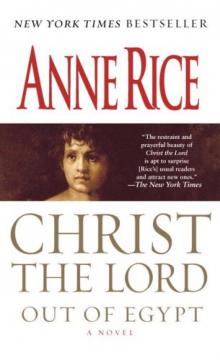 Christ the Lord: Out of Egypt
Christ the Lord: Out of Egypt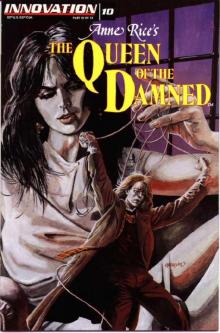 The Queen Of The Damned
The Queen Of The Damned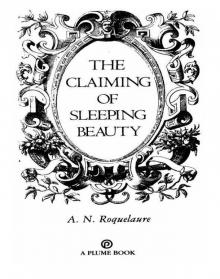 The Claiming of Sleeping Beauty
The Claiming of Sleeping Beauty Prince Lestat
Prince Lestat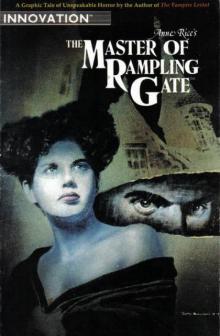 The Master of Rampling Gate
The Master of Rampling Gate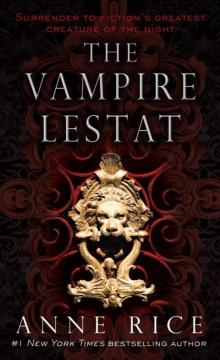 The Vampire Lestat
The Vampire Lestat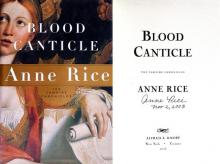 Blood Canticle
Blood Canticle Beauty's Release
Beauty's Release Pandora
Pandora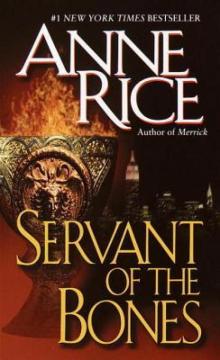 Servant of the Bones
Servant of the Bones Of Love and Evil
Of Love and Evil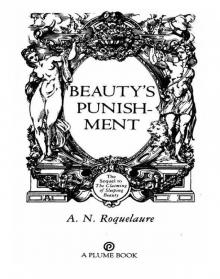 Beauty's Punishment
Beauty's Punishment Cry to Heaven
Cry to Heaven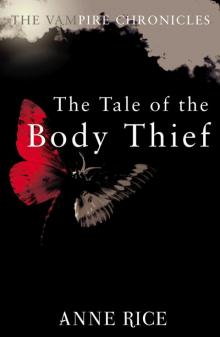 The Tale of the Body Thief
The Tale of the Body Thief The Witching Hour
The Witching Hour Memnoch the Devil
Memnoch the Devil Blackwood Farm
Blackwood Farm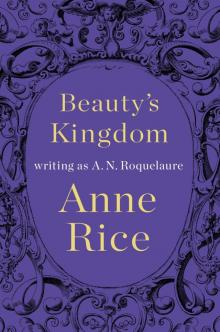 Beauty's Kingdom
Beauty's Kingdom Belinda
Belinda Lasher
Lasher Vittorio, the Vampire
Vittorio, the Vampire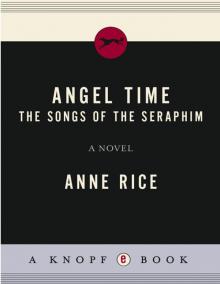 Angel Time
Angel Time Called Out of Darkness: A Spiritual Confession
Called Out of Darkness: A Spiritual Confession Blood And Gold
Blood And Gold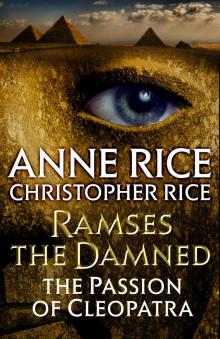 The Passion of Cleopatra
The Passion of Cleopatra Taltos
Taltos Exit to Eden
Exit to Eden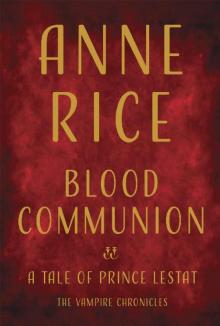 Blood Communion (The Vampire Chronicles #13)
Blood Communion (The Vampire Chronicles #13) The Wolf Gift
The Wolf Gift The Wolves of Midwinter
The Wolves of Midwinter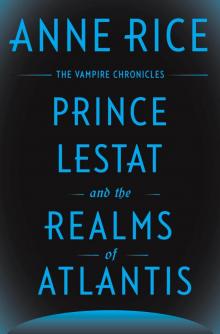 Prince Lestat and the Realms of Atlantis
Prince Lestat and the Realms of Atlantis The Ultimate Undead
The Ultimate Undead The Vampire Lestat tvc-2
The Vampire Lestat tvc-2 The Road to Cana
The Road to Cana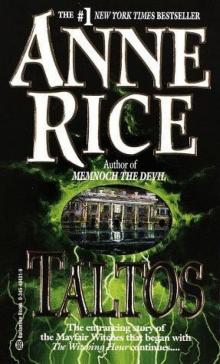 Taltos lotmw-3
Taltos lotmw-3 Merrick tvc-7
Merrick tvc-7 Called Out of Darkness
Called Out of Darkness Pandora - New Vampires 01
Pandora - New Vampires 01 Bllod and Gold
Bllod and Gold The Queen Of the Damned: Vampire Chronicles
The Queen Of the Damned: Vampire Chronicles The Sleeping Beauty Trilogy
The Sleeping Beauty Trilogy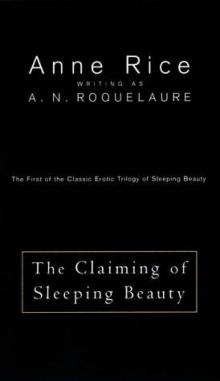 The Claiming of Sleeping Beauty b-1
The Claiming of Sleeping Beauty b-1 Lasher lotmw-2
Lasher lotmw-2 The Tale of the Body Thief tvc-4
The Tale of the Body Thief tvc-4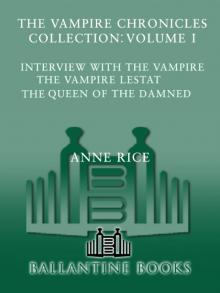 The Vampire Chronicles Collection
The Vampire Chronicles Collection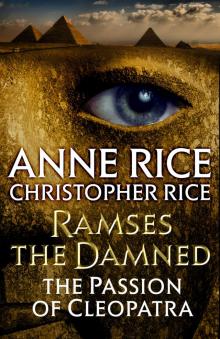 Ramses the Damned
Ramses the Damned The Mummy - or Ramses the Damned
The Mummy - or Ramses the Damned Vittorio, The Vampire - New Vampires 02
Vittorio, The Vampire - New Vampires 02 The Vampire Armand tvc-6
The Vampire Armand tvc-6 Queen of the Damned tvc-3
Queen of the Damned tvc-3 The witching hour lotmw-1
The witching hour lotmw-1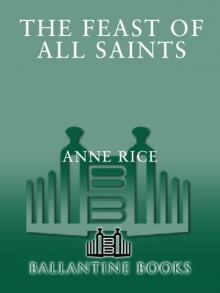 Feast of All Saints
Feast of All Saints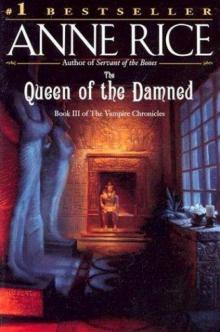 Queen of the Damned
Queen of the Damned The Wolves of Midwinter twgc-2
The Wolves of Midwinter twgc-2 The Mummy
The Mummy Blood and Gold tvc-8
Blood and Gold tvc-8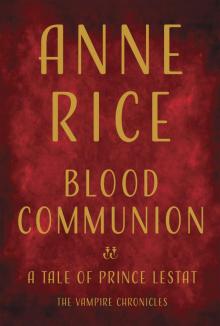 Blood Communion
Blood Communion Interview with the Vampire tvc-1
Interview with the Vampire tvc-1 Prince Lestat: The Vampire Chronicles
Prince Lestat: The Vampire Chronicles